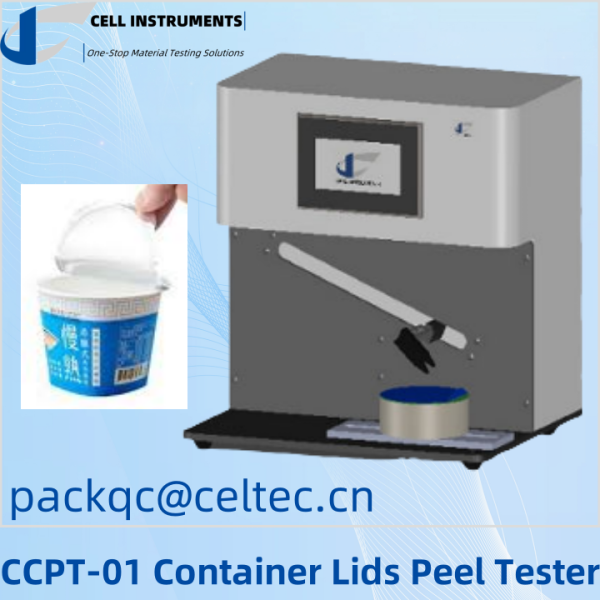Why the Peel Strength Test is Essential for Jelly Cup Lid Quality Assurance
The peel strength test plays a vital role in ensuring the quality and safety of jelly cup lids. This test measures the force required to peel a lid from its container, which is crucial for maintaining product integrity, preventing contamination, and ensuring consumer satisfaction. In this article, we will explore the importance of the peel strength test, particularly for jelly cup lids, and how it aligns with the ASTM F2824 standard.
I. The Significance of the Peel Strength Test
1. Ensuring Product Integrity
The peel strength test is essential for maintaining the integrity of products, especially in the food industry. A strong seal prevents leaks, preserves freshness, and protects against external contaminants. For jelly cup lids, this test ensures that the seal is robust enough to withstand handling and transportation without compromising the product inside.
2. Compliance with Industry Standards
Compliance with industry standards, such as ASTM F2824, is critical for manufacturers. This standard, titled “Standard Test Method for Mechanical Seal Strength Testing for Round Cups and Bowl Containers with Flexible Peelable Lids,” provides a consistent method for measuring seal strength. Adhering to this standard helps manufacturers ensure their products meet regulatory requirements and industry benchmarks.
II. Importance of ASTM F2824 for Jelly Cup Lids
1. Overview of ASTM F2824
The ASTM F2824 standard outlines the procedures for mechanical seal strength testing of round cups and bowl containers with flexible peelable lids. It specifies the test method to ensure reliability and reproducibility of results, which is crucial for maintaining quality and consistency across different batches of products.
2. Detailed Testing Procedures
- Calibration and Setup: Before starting the test, calibrate the force-measuring device to ensure accurate results. Set the peel rate to the specified 12 ± 0.5 in./min (300 ± 12.7 mm/min).
- Sample Preparation: Identify the peel line of the sample container and secure it in the test fixture, aligning the starting peel point with the peel line.
- Testing: Attach the lid’s peeling tab to the grip of the force-measuring device and initiate the test. Record the force required to peel the lid.
- Data Analysis: Analyze the recorded data, focusing on maximum, minimum, and average forces, and compare with industry standards to determine compliance.
3. Benefits of Compliance
Compliance with ASTM F2824 ensures that testing methods are standardized, enhancing credibility and reliability. It helps manufacturers maintain product quality, meet regulatory requirements, and build consumer trust.
III. The Role of the Peel Strength Test in Quality Assurance
1. Preventing Contamination
A strong seal is crucial for preventing contamination, especially in the food and pharmaceutical industries. The peel strength test ensures that jelly cup lids are sealed tightly, preventing any external contaminants from entering the product and compromising its safety.
2. Maintaining Product Freshness
For food products like jelly, maintaining freshness is vital for consumer satisfaction. A proper seal ensures that the product remains fresh for longer, preserving its taste and nutritional value. The peel strength test helps manufacturers ensure that their packaging meets these essential criteria.
3. Enhancing Consumer Trust
Consumers expect high-quality, safe, and reliable products. By conducting peel strength tests and adhering to ASTM F2824 standards, manufacturers can demonstrate their commitment to quality, safety, and consistency. This enhances consumer trust and brand reputation.
IV. Cell Instruments’ CCPT-01 Container Lids Peel Tester
1. Introduction
The CCPT-01 Container Lids Peel Tester by Cell Instruments is an advanced tool designed to measure the peel strength of container lids accurately. It provides reliable data to help maintain product integrity, safety, and compliance with industry standards.
2. Key Features
- High Precision and Accuracy: With an internal three-pillar structure, stepping motor, and precision ball screw, the tester ensures stable and accurate measurements.
- User-Friendly Interface: Equipped with a PLC and HMI color touchscreen, it is easy to operate and navigate.
- Customizable Test Parameters: Offers stepless speed regulation and both manual and automatic test initiation.
- Overload and Stroke Protection: Ensures the safety and longevity of the instrument.
- Automated Data Recording and Analysis: Real-time force curve display and automated calculation of maximum, minimum, and average forces.
3. Applications
The CCPT-01 is versatile and can be used across various industries, including packaging, food, medical, and pharmaceuticals, to ensure product quality and safety.
V. FAQ
The peel strength test measures the force required to peel a lid from its container, ensuring the seal’s strength and integrity.
It ensures the lids are sealed tightly, preventing contamination and maintaining product freshness.
ASTM F2824 is a standard test method for measuring the mechanical seal strength of round cups and bowl containers with flexible peelable lids.
The CCPT-01 measures peel strength with high precision and accuracy, offering customizable test parameters and automated data recording.
Yes, the CCPT-01 can be tailored to meet specific testing requirements for various container shapes and sizes.
The peel strength test is crucial for ensuring the quality and safety of jelly cup lids. Adhering to the ASTM F2824 standard and using advanced instruments like the CCPT-01 Container Lids Peel Tester from Cell Instruments can help manufacturers maintain product integrity, meet regulatory requirements, and build consumer trust.
Related Product
Related Article
Cup and Container Peeling Tester
Measure the Seal Strength of Peel Lids for Jelly Cups
Peel Tester for Instant Cup Noodle Lid
45 Degree Peel for Jelly Container Lid

